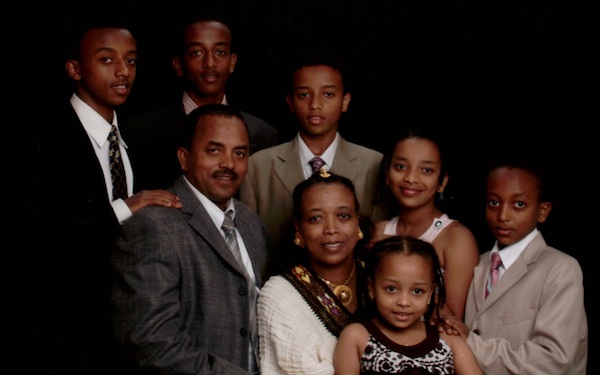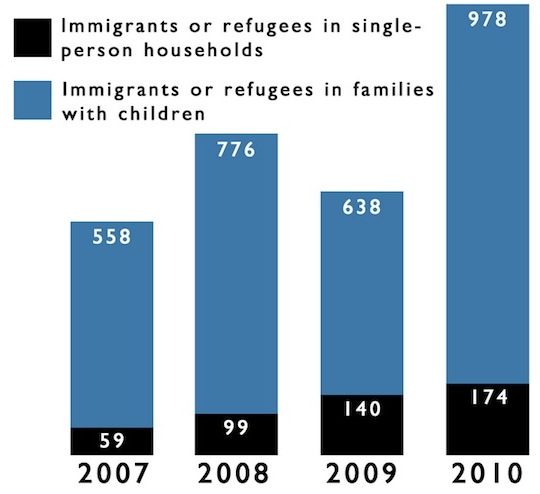
Winta Kassaye is a high school student and participant in GirlsFirst, a YWCA program that encourages leadership, instills confidence, develops skills, and provides opportunities to girls of color. She spent her summer working as a paid intern for the YWCA’s Advancement Team, and said her favorite assignment was writing this blog.
We thank Winta for the thoughtfulness she put into this post and for all her contributions as an intern. We wish her the best in the new school year and volleyball season!
Written by Winta Kassaye, Advancement Intern for the YWCA Seattle | King | Snohomish and GirlsFirst participant
Having shelter and your basic needs met is important; I believe that being surrounded by family and others who can support you is just as important. I am very lucky to have both.
There are nine people in my family — I have five brothers, one sister, plus me and my parents. I was born in Ethiopia. When I was a little girl, if you had told me that I would now be living in America, I would have never believed you. About eight years ago, we had the opportunity to move to the United States and start our new lives here. Even though my parents had a lot of businesses in Ethiopia and we had pretty much everything we could ask for, they decided it would be a good choice for us to move. Later on, I discovered why they made that decision: they wanted their children to have the best education possible so that we could choose any path we wanted to for our future.
In 2006, we arrived in Seattle, where we had family friends who had lived here for a long time. They helped us find a great place to live, got me and my siblings enrolled in good schools and even helped my dad land a job. The first few weeks were difficult, since we were all trying to learn a new language and a completely different culture. But I now realize that it could have been even more difficult if we hadn’t had people to help us through all of it.
In 2011, 40.4 million foreign-born people were living in the United States. Washington consistently ranks as one of the top 10 states for new arrivals, so there are many stories of immigration in our community. My story turned out well, but many of those 40.4 million people who immigrated to America hoping to live the “American Dream” were not so fortunate.
One example of this is a family friend named Martin*, who left his family back in Ethiopia and came to Seattle by himself when he was 33 years old. He did not know anyone in America and had to figure out a way to get an apartment with the money he had brought with him. For a couple of months he tried to get a job, but he had no luck in finding one because he did not speak English and barely even had a resume.
With no job and no income, his money was soon gone. He was evicted and had no choice but to sell most of his belongings and start living in a motel. He told me, “At that point, all I could think about was that I had told my wife and three children I would find a way to get them here, and now I am practically homeless.”
While living in the motel and eating gas station food, he learned some English and within a couple months, he finally landed a job as a school janitor making minimum wage. But he still struggled and even though he had found a job, at one point he had to live in a homeless shelter for several weeks.
In King County alone, hundreds of refugees and immigrants find themselves in transitional housing and shelters as Martin did. From 2007-2010, King County’s annual one night count of people in emergency shelters or transitional housing programs included information on whether a person identified as a refugee or immigrant. The results are in this chart:

Martin’s story does have a happy ending. After 11 years of struggle, he is now proud to call himself a citizen of the United States of America. His whole family lives here, he speaks English fluently, and is a homeowner, with the help of Habitat for Humanity.
I asked Martin what he would have done differently when he first moved here. He said that he would have looked for more resources, like interpreters who could have helped him look for jobs or organizations that would have helped him with housing and welfare.
Some immigrants don’t know English, so how can they know about all the opportunities for help, especially if they do not know anyone in the country? There are also thousands of undocumented immigrants who have little choice but to try and make it on their own.
You might think, “I’m just one person — how much of a difference can I make? There is no way I can help these people.” But there is something you can do – make your voice heard on Firesteel. You can make a difference by talking to people about these problems, which are often ignored by the general public. Here is your chance to speak up for those who can’t speak up for themselves.

*Martin’s name has been changed to protect his privacy.
Read past posts about immigration and homelessness
- Housing case manager Joanna den Haan writes about challenges undocumented immigrants face in “We Are Here. We Are Home.“
- Health care access advocate Devin Seman reflects on immigrants’ and refugees’ access to resources in “May Day: International Worker’s Day“